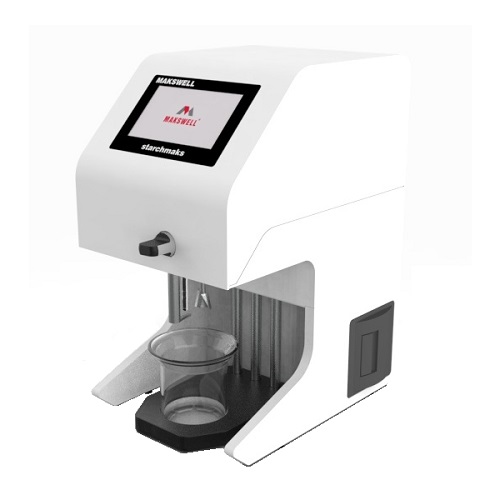Makswell Makine Gıda Medikal Ltd. Şti., as manufacturer of quality control equipments produces special devices for grains, feed, wheat and flour laboratories and exports to 38 different countries. Our company, which stands out in the sector with its experienced staff and wide product range, develops easy-to-use and customizable devices that meet quality control needs.
İvedik OSB Mah. 1514. Cadde, No:3 Yenimahalle, Ankara, Turkey
+90 312 395 67 37
Starchmaks measures starch damage in flour samples with using the amperometry method. The device measures the amount of iodine absorbed by starch granules in a flour suspension diluted with special solution. More iodine absorbed means more damaged starch. The analysis takes approximately 10 minutes with a 1 g flour sample. The analysis results are reproducible and standardized measurements and also the results are in good agreement with the enzyme-based method results. Test results are expressed as % of iodine absorption in units AI, UCD, UCDc, AACC, FARRAND.
• High resolution color touch screen
• Ability to create different calibrations for different types of flour
• Latest generation electrode technology
• Automatic electrode cleaning feature
Thermal Printer: Possibility to print the results with the internal printer after each test
ARM Processor: Display and control electronic cards are powered by ARM technology
Internal Memory: Analysis results are automatically saved after each test in the software
Power Supply : Protects the device against voltage changes between 100-240 V
Fault Detection System: Possibility to control all equipment from the screen


Amount of Damaged Starch: It is the damage of the starch particles in the flour due to the pressure they encounter during milling. Normally, approximately 4% starch damage occurs in bread flour during milling. As the amount of damaged starch increases, the working time of amylase enzymes increases, fermentation time decreases, the ability of the dough to be processed in machines decreases, and the inside of the bread becomes sticky. In flours with low amounts of damaged starch, amylase activity stops in a short time. Especially in the last fermentation phase, the dough does not rise and the bread volume becomes small and flat.
Analysis Phases:
Bringing the solution to the required temperature (35º)
Measurement of existing electrochemical unit (µA)
Electrochemical production of iodine
Measuring the amount of iodine that reaches its maximum level (µA)
Discharging the sample into solution
Measuring the amount of absorbed iodine (180 seconds)